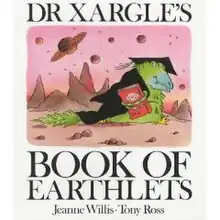 Cover of Dr Xargle's Book of Earthlets, the first in the series (1988), art by Tony Ross | |
| Author | Jeanne Willis |
|---|---|
| Illustrator | Tony Ross |
| Language | English |
| Publisher | E. P. Dutton |
| Published | 1988-2004 |
Dr. Xargle /ˈzɑːrɡəl/ is a series of children's picture books written by Jeanne Willis and illustrated by Tony Ross; the original six books were published by Andersen Press from 1988 to 1993. It features an alien perspective on human civilization, especially the life of British children and their families. Alternatively, Dr. Xargle is the main character, an alien who studies Earth and teaches schoolchildren about it. Sometimes he takes them on field trips to Earth in human disguises. Finally, Dr. Xargle is a 1997 British television series based on the original books.
For the third book in the series, Dr. Xargle's Book of Earth Tiggers (1990), Ross was highly commended runner up for the annual Kate Greenaway Medal from the Library Association, recognising the year's best children's book illustration by a British subject.[1][lower-alpha 1]
Books
All seven books were published in hardcover editions by Andersen Press. The original series was published in British paperback editions by Red Fox (Random House) within a few years. In the United States, the books have titles such as Earthlets, as explained by Professor Xargle—the first book, published by E. P. Dutton in 1989.
- Dr. Xargle's Book of Earthlets (1988)
- Dr. Xargle's Book of Earth Hounds (1989)
- Dr. Xargle's Book of Earth Tiggers (1990), A.K.A Earth Tigerlets
- Dr. Xargle's Book of Earth Mobiles (1991)
- Dr. Xargle's Book of Earth Weather (1992)
- Dr. Xargle's Book of Earth Relations (1993)
- Dr. Xargle Stories (1999), an Audiobook collection of all the books except Sleepovers
- Dr. Xargle's Book of Earthlet Sleepovers (2004), a limited edition picture book written to provide support for children who wet the bed
Television series
A 13-episode television series was produced by CINAR and King Rollo Films, and broadcast in 1997: Dr. Xargle and his students are animatronic puppets, while the students' lessons about Earth are animated.
Unnamed in the books, the planet was identified as Planet Queeg, and the children were called Queegles. It is unclear whether their species is named Queegle, or this is the name for their infants (the adults being called Queegs).
Characters
- Dr. Xargle: Voiced by Willie Rushton, who died shortly after his lines were recorded.
- Xamster
- Matron
- Monitor
- Cute
- Rebel
- Tardy Queegle
- Famished Queegle
- Nigel Spume, a human reporter trying to prove the aliens' existence.
Episodes
Each of the 13 episodes had a duration of approximately 30 minutes.
Several episode broadcast dates, as well as the episode order, are currently unknown.
There was also a break in broadcasting that has not yet been accounted for.
| Episode number | Episode name | Topic | Original airdate |
|---|---|---|---|
| 1 | Earthlets | Infants | 26 February 1997 |
| 2 | Earth Hounds | Dogs | 5 March 1997 |
| 3 | Earth Mobility | Transport | 12 March 1997 |
| 4 | Earth Weather | Weather | 28 July 1997 |
| 5 | Earth Thingummies | Gadgets | Unknown |
| 6 | Earth Jobbery | Careers | Unknown |
| 7 | Earth Nicety | Manners | Unknown |
| 8 | Earth Relativity | Family | Unknown |
| 9 | Earth Snacky | Food | Unknown |
| 10 | Earth Trendy | Fashion | Unknown |
| 11 | Earth Furnishy | Furniture | Unknown |
| 12 | Earth Sport | Sport & Fitness | Unknown |
| 13 | Earth Tiggers | Cats | Unknown |
Notes
- ↑ Today there are usually eight books on the Greenaway shortlist. According to CCSU, some runners up were Commended (from 1959) or Highly Commended (from 1974). The high distinction was approximately annual from 1979, including Ross alone for 1990.
References
- ↑ "Kate Greenaway Medal" Archived 16 September 2014 at the Wayback Machine. 2007(?). Curriculum Lab. Elihu Burritt Library. Central Connecticut State University (CCSU). Retrieved 2012-06-26.
External links
- Earthlets, as Explained by Professor Xargle in libraries (WorldCat catalog) —US editions of the first book; immediately, first US edition
- More about Dr Xargle's Book of Earthlet Sleepovers
- TV Show Information
- TV Show episode synopses and opening titles